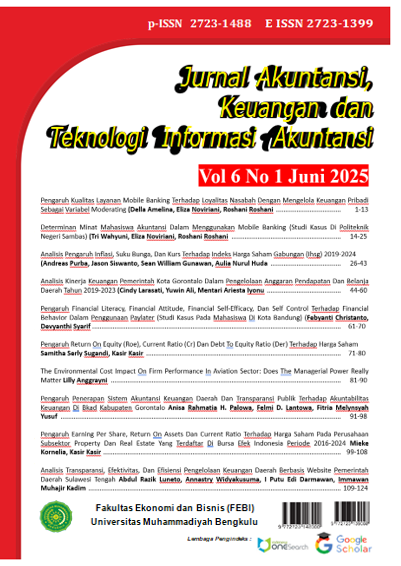ANALISIS TRANSPARANSI, EFEKTIVITAS, DAN EFISIENSI PENGELOLAAN KEUANGAN DAERAH BERBASIS WEBSITE PEMERINTAH DAERAH SULAWESI TENGAH
DOI:
https://doi.org/10.36085/jakta.v6i1.8424Abstract
This study examines the transparency, effectiveness, and efficiency of financial management in 13 district/city governments in Central Sulawesi using a descriptive qualitative approach with the content analysis method. Data were obtained from the official website of the regional government for the 2023 budget year and measured based on transparency indicators at the planning, implementation, and reporting and accountability stages of the APBD. The results of the study show that Banggai Laut Regency has the highest transparency index (98.28%), while Toli-Toli Regency has the lowest (27.59%). The average level of financial management effectiveness reaches 93%, categorized as effective, although there are disparities between regions. The main obstacles to transparency lie in limited infrastructure and human resource capacity. These findings emphasize the importance of technological support, human resource training, and provincial government policies to encourage transparency and accountability of regional finances in a sustainable manner.
Keywords: Transparency of Financial Management, Effectiveness of Regional Finances of District/City Governments
References
Adriana, A., & Ritonga, I. T. (2018). Analysis of Local Financial Management Transparency Based on Websites on Local Government in Java. Jurnal Dinamika Akuntansi, 10(1), 13–26. https://doi.org/10.15294/jda.v10i1.12558
Araujo, J. F. F. E. de, & Tejedo-Romero, F. (2016). Local Government Transparency Index: Determinants of Municipalities’ Rankings. International Journal of Public Sector Management, 29(4). https://doi.org/10.1108/IJPSM-11-2015-0199
Bastian, I. (2010). Akuntansi Sektor Publik; Suatu Pengantar (Ketiga). Erlangga.
Bonsón, E., Torres, L., Royo, S., & Flores, F. (2012). Local e-government 2.0: Social Media and Corporate Transparency in Municipalities. Government Information Quarterly, 29(2), 123–132. https://doi.org/10.1016/j.giq.2011.10.001
Devinci, M. Y., Dekrita, Y. A., & Samosir, M. S. (2022). Analisis Efisiensi dan Efektivitas Pengelolaan Keuangan Daerah Di Kabupaten Sikka. Jurnal Projemen UNIPA, 9(2), 51–70.
Hendrastuti, R., & Harahap, R. F. (2023). Agency Theory: Review of the Theory and Current Research. Jurnal Akuntansi Aktual, 10(1), 85. https://doi.org/10.17977/um004v10i12023p085
Hirsch, W. Z., & Osborne, E. (2000). Privatization of Government Services: Pressure-Group Resistance and Service Transparency. Journal of Labor Research, 21(2). https://doi.org/10.1007/s12122-000-1050-z
Hood, C. (1995). The “New Public Management” in the 1980s: Variations on a Theme. Accounting, Organizations and Society, 20(2–3). https://doi.org/10.1016/0361-3682(93)E0001-W
Insani, N. G., & Ritonga, I. T. (2017). Analisis Transparansi Pengelolaan Keuangan Daerah Berbasis Website Pada Pemerintah Daerah di Sulawesi. Accounting and Business Information Systems Journal, 5(4).
Jensen, M. C., & Meckling, W. H. (1976). Theory of The Firm: Managerial Behavior, Agency Costs and Ownership Structure. Journal of Financial Economics, 3, 305–360.
Kim, P. S., Halligan, J., Cho, N., Oh, C. H., & Eikenberry, A. M. (2005). Toward Participatory and Transparent Governance: Report on the Sixth Global Forum on Reinventing Government. Public Administration Review, 65(6). https://doi.org/10.1111/j.1540-6210.2005.00494.x
Koromath Paulus, J. (2020). Analisis Efisiensi dan Efektivitas Pengelolaan Keuangan Daerah di Kabupaten Manokwari. Lensa Ekonomi, 11(1).
Mardiasmo. (2009). Akuntansi Sektor Publik. Andi Offset.
Martani, D., Fitriasari, D., & Annisa. (2014). Financial and Performance Transparency on the Local Government Websites in Indonesia. Journal of Theoretical and Applied Information Technology, 60(3), 504–516.
Miller, G. J. (2005). The Political Evolution of Principal-Agent Models. In Annual Review of Political Science (8; Vol. 8). https://doi.org/10.1146/annurev.polisci.8.082103.104840
Narastri, M. (2022). Principles and Agents: The Phenomenon of Agency Theory In The Business Sector and The Public Sector. The Strategy of Digitalization in Business for Gaining Competitive Advantages after Pandemic, 105–109.
Nurhadianto, T., & Khamisah, N. (2019). Analisis Transparansi Pengelolaan Keuangan Daerah; Studi Empiris Pada Pemerintah Daerah Kabupaten/Kota di Provinsi Lampung. Journal Technobiz, 3(5), 25–30.
Puspitasari, A., & Adil, M. (2020). Opini Audit Atas Pengungkapan Laporan Keuangan Pemerintah Kabupaten di Sulawesi Selatan. SIMAK, 18(1), 69–83.
Putri, A. M., Suriyanti, L. H., & Hastanto, A. M. (2023). Faktor-Faktor yang Mempengaruhi Efektivitas Pengelolaan Keuangan Daerah. Jurnal Ekobistek, 12(1), 486–494. https://doi.org/10.35134/ekobistek.v12i1.500
Rahman, A. Z., & Saputra, F. L. (2022). Efisiensi dan Efektivitas dalam Pengelolaan Keuangan Daerah Kabupaten Cilacap. Humanika, Kajian Ilmiah Mata Kuliah Umum, 22(2), 117–126. https://doi.org/10.21831/hum.v22i2
Ritonga, I. T., & Syamsul. (2016). Mengukur Transparansi Pengelolaan Keuangan Daerah di Indonesia: Berbasis website. Jurnal Akuntansi & Auditing Indonesia, 20(2), 110–126. https://doi.org/10.20885/jaai.vol20.iss2.art4
Schillemans, T., & and Bjurstrøm, K. H. (2020). Trust and Verification: Balancing Agency and Stewardship Theory in the Governance of Agencies. International Public Management Journal, 23(5), 650–676. https://doi.org/10.1080/10967494.2018.1553807
Shin, R. (2001). Strategies for Economic Development Under Decentralization: A Transformation of the Political Economy. International Journal of Public Administration, 24(10). https://doi.org/10.1081/PAD-100105103
Siagian, B. B., Maryunani, Krishna Sakti, R., & Budi Santoso, D. (2016). Efficiency and Effectiveness Analysis Of Village Financial Management (VFM). International Journal of Social and Local Economic Governance (IJLEG), 2(2), 136–151. http://ijleg.ub.ac.id
Siregar, H. O., & Muslih, M. (2018). Pengelolaan Keuangan Pemerintah Daerah Menggunakan Open Budget Index (OBI). Online Insan Akuntan, 3(Desember), 161–172. www.igi-global.com].
South, N., Tinangon, J., & Rondonuwu, S. (2016). Pengukuran Efisiensi dan Efektivitas Pengelolaan Keuangan Daerah Pada Dinas Pengelola Keuangan, Pendapatan dan Aset (DPKPA) Kabupaten Minahasa Selatan. Jurnal EMBA, 4(1), 613–622.
Sukran, Rajindra, & Yusuf, D. (2020). Analisis Kualitas Laporan Keuangan Pemerintah Daerah Provinsi Sulawesi Tengah. Jurnal Kolaboratif Sains, 3(8), 421–429.
Sunarti, Sarwono, A. E., & Rahmawati. (2017). Sistem Pengendalian Intern Pemerintah (SPIP), Ketidakpatuhan Regulasi dan Kualitas Laporan Keuangan Pemerintah Daerah. Jurnal Ekonomi Paradigma, 19(2), 38–73.
Suwarsih, A., & Ritonga, I. T. (2017). Analisis Transparansi Pengelolaan Keuangan Daerah Berbasis Website Pada Pemerintah Daerah Di Sumatra. Accounting and Business Information Systems Journal , 5(1).
Van Thiel, S., & Leeuw, F. L. (2002). The Performance Paradox in the Public Sector. Public Performance & Management Review, 3(25), 267–281. https://doi.org/https://doi.org/10.2307/3381236
Welly, Arifin, M. S., & Ghozali, R. (2021). Analisis Transparansi Pengelolaan Keuangan Pemerintah Daerah Berbasis Website Se-Jawa Bali. Balance: Jurnal Akuntansi Dan Bisnis, 6(1), 157–167. http://jurnal.um-palembang.ac.id/balance



















